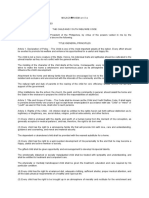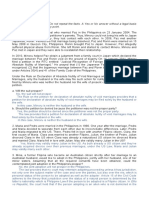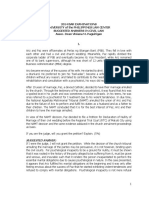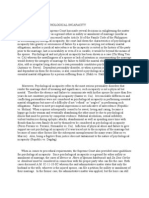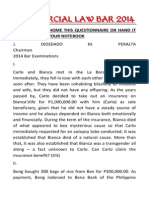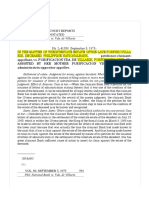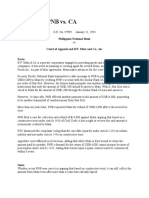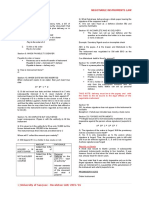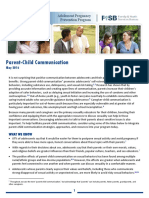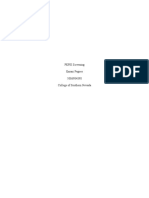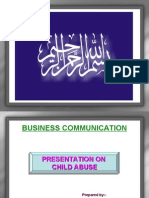Persons and Family Relations
Persons and Family Relations
Uploaded by
Ling EscalanteCopyright:
Available Formats
Persons and Family Relations
Persons and Family Relations
Uploaded by
Ling EscalanteOriginal Description:
Copyright
Available Formats
Share this document
Did you find this document useful?
Is this content inappropriate?
Copyright:
Available Formats
Persons and Family Relations
Persons and Family Relations
Uploaded by
Ling EscalanteCopyright:
Available Formats
PERSONS AND FAMILY RELATIONS _ Final Exams
Page
MARRIAGE
ESSENTIAL REQUISITES IN MARRIAGE
Legal capacity of the contracting parties (age, gender, relationship of parties, no legal
impediments) and consent
FORMAL REQUISITES IN MARRIAGE
Authority of the solemnizing officer, valid marriage license, marriage ceremony
It is only in the case of the solemnizing officer where absence of formal requisite do not affect
the validity of the marriage (where one or both of the parties acted in good faith that the
solemnizing officer has the authority to solemnize the marriage)
In the absence of any formal requisite, the marriage is void
An irregularity on any of the requisite does not affect the validity of the marriage but the person liable
for the irregularity is can be deemed civilly or administratively liable
INSTANCES WHERE A MARRRIAGE LICENSE CAN BE DISPENSED WITH
Marital co-habitation
Requirements:
Where a man and woman lived for at least five (5) years in which they do not have any
legal impediments within the period of cohabitation
DEFECTIVE MARRIAGES (Void Marriages and Voidable Marriages)
Void Marriages
Article 35. VOID AB INITIO MARRIAGE
1. Those contracted by any party below eighteen years of age even with the consent of
parents or guardians;
2. Those solemnized by any person not legally authorized to perform marriages unless such
marriages were contracted with either or both parties believing in good faith that the
solemnizing officer had the legal authority to do so;
3. Those solemnized without license, except those covered the preceding Chapter;
4. Those bigamous or polygamous marriages not failing under Article 41;
5. Those contracted through mistake of one contracting party as to the identity of the other;
and
6. Those subsequent marriages that are void under Article 53.
Article 36. PSYCHOLOGICAL INCAPACITY
7. Due to Psychological Incapacity
Article 37. INCESTUOUS MARRIAGE
8. Between ascendants and descendants of any degree; and
9. Between brothers and sisters, whether of the full or half blood.
Article 38. BY REASON OF PUBLIC POLICY
10. Between collateral blood relatives whether legitimate or illegitimate, up to the fourth civil
degree;
11. Between step-parents and step-children;
12. Between parents-in-law and children-in-law;
13. Between the adopting parent and the adopted child;
14. Between the surviving spouse of the adopting parent and the adopted child;
15. Between the surviving spouse of the adopted child and the adopter;
16. Between an adopted child and a legitimate child of the adopter;
17. Between adopted children of the same adopter; and
18. Between parties where one, with the intention to marry the other, killed that other person's
spouse, or his or her own spouse. (82)
Article 44. SUBSEQUENT MARRIAGE IN A PRESUMPTIVE DEATH
19. If both spouses of the subsequent marriage (in relation to presumptive death) acted in bad
faith,
Article 53
20. If the previous marriage has not been annulled or declared void, and declaration of nullity
was not declared void (before the civil registry) before contracting a subsequent marriage
Children out of a void marriage are illegitimate
PERSONS AND FAMILY RELATIONS _ Final Exams
Page
Void marriages with legitimate offsprings
o Article 36
o Article 53
Voidable Marriage
Effects of the annulment of a voidable marriage
Art. 43. The termination of the subsequent marriage referred to in the preceding Article shall
produce the following effects: (1st item applicable only for valid bigamous marriage)
1) The children of the subsequent marriage conceived prior to its termination shall be
considered legitimate;
Since the second marriage is valid, then the children conceived before the
termination of the subsequent marriage are considered legitimate.
However, if a child is conceived or born out after the termination of the second
marriage, then the child is illegitimate
2) The absolute community of property or the conjugal partnership, as the case may be,
shall be dissolved and liquidated, but if either spouse contracted said marriage in bad
faith, his or her share of the net profits of the community property or conjugal
partnership property shall be forfeited in favor of the common children or, if there are
none, the children of the guilty spouse by a previous marriage or in default of children,
the innocent spouse;
Properties have to be divided. However, if either spouse contracted marriage in
bad faith, his or her share of the net profits shall be forfeited in favor of the
common children or, if there are none, the children of the guilty spouse by a
previous marriage or in default of children, the innocent spouse
If any one of them knows that the absent spouse is alive then he/she is asking
in bad faith. And thus his share in the net profit (increase in the value of
properties) is forfeited
3) Donations by reason of marriage shall remain valid, except that if the donee
contracted the marriage in bad faith, such donations made to said donee are revoked
by operation of law;
Automatic termination of marriage which is contracted in bad faith also results
to automatic revocation by operation of law. Thus the donor does not have to
file action in court to revoke donation
However if it is out of good faith, then the donation remains as a valid donation
4) The innocent spouse may revoke the designation of the other spouse who acted in bad
faith as beneficiary in any insurance policy, even if such designation be stipulated as
irrevocable; and
An act of revocation must be done first
5) The spouse who contracted the subsequent marriage in bad faith shall be disqualified
to inherit from the innocent spouse by testate and intestate succession.
Disqualification from inheriting. Designation as an heir is also revoked
LEGAL SEPARATION
Requirement for the delivery of the presumptive legitime (none) (delivery of presumptive
legitime is only necessary in the declaration of nullity of a void marriage for non-observance of
article 40 and case of annulment of Voidable marriages)
PROPERTY RELATION OF SPOUSES
What governs the property relation of spouses?
a) Marriage Settlement (entered into by the party prior to the celebration of the
marriage)
b) Default property regime in the Family code Absolute Community of Property (In the
absence of a marriage settlement or in the case where marriage settlement is declared
void)
c) Local Custom
ABSOLUTE COMMUNITY OF PROPERTY
Properties brought into the marriage become community property
PERSONS AND FAMILY RELATIONS _ Final Exams
Exclusive property (Art 92) those not specified therein are considered community
property
o Properties which are considered exclusive in a marriage settlement
o Properties acquired during the marriage by gratuitous title including the
income or fruits therefrom
o Properties for the exclusive and person property of each spouse excluding
jewelries
o Those acquired prior to the marriage by one who has legitimate descendant of
a previous marriage
Charges and Liabilities against the absolute community
Page
Art. 94. The absolute community of property shall be liable for:
(1) The support of the spouses, their common children, and legitimate children of
either spouse; however, the support of illegitimate children shall be governed by the
provisions of this Code on Support;
(2) All debts and obligations contracted during the marriage by the designated
administrator-spouse for the benefit of the community, or by both spouses, or by one
spouse with the consent of the other;
(3) Debts and obligations contracted by either spouse without the consent of the
other to the extent that the family may have been benefited;
(4) All taxes, liens, charges and expenses, including major or minor repairs, upon the
community property;
(5) All taxes and expenses for mere preservation made during marriage upon the
separate property of either spouse used by the family;
(6) Expenses to enable either spouse to commence or complete a professional or
vocational course, or other activity for self-improvement;
(7) Ante-nuptial debts of either spouse insofar as they have redounded to the benefit
of the family;
(8) The value of what is donated or promised by both spouses in favor of their
common legitimate children for the exclusive purpose of commencing or completing
a professional or vocational course or other activity for self-improvement;
(9) Ante-nuptial debts of either spouse other than those falling under paragraph (7)
of this Article, the support of illegitimate children of either spouse, and liabilities
incurred by either spouse by reason of a crime or a quasi-delict, in case of absence
or insufficiency of the exclusive property of the debtor-spouse, the payment of which
shall be considered as advances to be deducted from the share of the debtor-spouse
upon liquidation of the community; and
(10) Expenses of litigation between the spouses unless the suit is found to be
groundless.
If the community property is insufficient to cover the foregoing liabilities, except
those falling under paragraph (9), the spouses shall be solidarily liable for the unpaid
balance with their separate properties.
Procedure in Liquidation
Art. 102. Upon dissolution of the absolute community regime, the following
procedure shall apply:
(1) An inventory shall be prepared, listing separately all the properties of the
absolute community and the exclusive properties of each spouse.
(2) The debts and obligations of the absolute community shall be paid out of its
assets. In case of insufficiency of said assets, the spouses shall be solidarily liable for
the unpaid balance with their separate properties in accordance with the provisions
of the second paragraph of Article 94.
(3) Whatever remains of the exclusive properties of the spouses shall thereafter be
delivered to each of them.
(4) The net remainder of the properties of the absolute community shall constitute its
net assets, which shall be divided equally between husband and wife, unless a
different proportion or division was agreed upon in the marriage settlements, or
unless there has been a voluntary waiver of such share provided in this Code. For
purpose of computing the net profits subject to forfeiture in accordance with Articles
43, No. (2) and 63, No. (2), the said profits shall be the increase in value between the
PERSONS AND FAMILY RELATIONS _ Final Exams
Page
market value of the community property at the time of the celebration of the
marriage and the market value at the time of its dissolution.
(5) The presumptive legitimes of the common children shall be delivered upon
partition, in accordance with Article 51.
(6) Unless otherwise agreed upon by the parties, in the partition of the properties,
the conjugal dwelling and the lot on which it is situated shall be adjudicated to the
spouse with whom the majority of the common children choose to remain. Children
below the age of seven years are deemed to have chosen the mother, unless the
court has decided otherwise. In case there in no such majority, the court shall
decide, taking into consideration the best interests of said children. (n)
CONJUGAL PARTNERSHIP OF GAINS
For this to govern a marriage, a marriage settlement should be entered into prior the
marriage
What constitutes Conjugal property are those acquired during the marriage out of the
income or the fruits of separate properties
Exclusive Property
o Properties acquired prior the marriage
o Properties acquired by gratuitous title during the marriage
o Properties acquired through right of redemption or exchange/ barter using
exclusive property
o Properties acquired with the use of ones exclusive money
How to determine if a property is converted to conjugal property?
o Rules if improvements are introduced to an exclusive property - Compare the
values
o Purchase of property prior the marriage in installment basis wherein payment
is continued during the marriage - Determine when the ownership was vested
(if prior the marriage it is exclusive; while if ownership is vested during the
marriage, it is conjugal: all subject to reimbursement upon liquidation )
Charges and liabilities against the conjugal property
Art. 121. The conjugal partnership shall be liable for:
(1) The support of the spouse, their common children, and the legitimate children of
either spouse; however, the support of illegitimate children shall be governed by the
provisions of this Code on Support;
(2) All debts and obligations contracted during the marriage by the designated
administrator-spouse for the benefit of the conjugal partnership of gains, or by both
spouses or by one of them with the consent of the other;
(3) Debts and obligations contracted by either spouse without the consent of the other
to the extent that the family may have benefited;
(4) All taxes, liens, charges, and expenses, including major or minor repairs upon the
conjugal partnership property;
(5) All taxes and expenses for mere preservation made during the marriage upon the
separate property of either spouse;
(6) Expenses to enable either spouse to commence or complete a professional,
vocational, or other activity for self-improvement;
(7) Ante-nuptial debts of either spouse insofar as they have redounded to the benefit
of the family;
(8) The value of what is donated or promised by both spouses in favor of their common
legitimate children for the exclusive purpose of commencing or completing a
professional or vocational course or other activity for self-improvement; and
(9) Expenses of litigation between the spouses unless the suit is found to groundless.
If the conjugal partnership is insufficient to cover the foregoing liabilities, the spouses
shall be solidarily liable for the unpaid balance with their separate properties.
Procedure in the case of liquidation
PERSONS AND FAMILY RELATIONS _ Final Exams
Page
Art. 129. Upon the dissolution of the conjugal partnership regime, the following
procedure shall apply:
(1) An inventory shall be prepared, listing separately all the properties of the conjugal
partnership and the exclusive properties of each spouse.
(2) Amounts advanced by the conjugal partnership in payment of personal debts and
obligations of either spouse shall be credited to the conjugal partnership as an asset
thereof.
(3) Each spouse shall be reimbursed for the use of his or her exclusive funds in the
acquisition of property or for the value of his or her exclusive property, the ownership
of which has been vested by law in the conjugal partnership.
(4) The debts and obligations of the conjugal partnership shall be paid out of the
conjugal assets. In case of insufficiency of said assets, the spouses shall be solidarily
liable for the unpaid balance with their separate properties, in accordance with the
provisions of paragraph (2) of Article 121.
(5) Whatever remains of the exclusive properties of the spouses shall thereafter be
delivered to each of them.
(6) Unless the owner had been indemnified from whatever source, the loss or
deterioration of movables used for the benefit of the family, belonging to either
spouse, even due to fortuitous event, shall be paid to said spouse from the conjugal
funds, if any.
(7) The net remainder of the conjugal partnership properties shall constitute the
profits, which shall be divided equally between husband and wife, unless a different
proportion or division was agreed upon in the marriage settlements or unless there has
been a voluntary waiver or forfeiture of such share as provided in this Code.
(8) The presumptive legitimes of the common children shall be delivered upon the
partition in accordance with Article 51.
(9) In the partition of the properties, the conjugal dwelling and the lot on which it is
situated shall, unless otherwise agreed upon by the parties, be adjudicated to the
spouse with whom the majority of the common children choose to remain. Children
below the age of seven years are deemed to have chosen the mother, unless the court
has decided otherwise. In case there is no such majority, the court shall decide, taking
into consideration the best interests of said children.
UNIONS WITHOUT MARRIAGE
Article 147 applicable to cases where (1) man and woman are exclusively living
together as husband and wife without marriage or under a (2) void marriage
(psychological incapacity) where parties do not have legal impediment to marry each
other
o Property relationship is a special type of co-ownership: Equal sharing of
properties where maintenance of the household is also considered as ones
contribution
Article 148 all other unions without marriage (excluded from that of Art 147)
o Property relationship is governed by co-ownership which provides that the
sharing in the property is in accordance with ones actual contribution
FAMILY
Kinds of Children
LEGITIMATE - Those who are conceived or born inside a valid marriage
o Rights of the legitimate child
Art. 174. Legitimate children shall have the right:
(1) To bear the surnames of the father and the mother, in conformity with the
provisions of the Civil Code on Surnames;
(2) To receive support from their parents, their ascendants, and in proper
cases, their brothers and sisters, in conformity with the provisions of this Code
on Support; and
(3) To be entitled to the legitimate and other successional rights granted to
them by the Civil Code.
ILLEGITIMATE - Those who are conceived or born outside a valid marriage
The legitimacy of the child can only be impugned by the father/ husband
PERSONS AND FAMILY RELATIONS _ Final Exams
within one year from the knowledge of the birth or its recording in the civil register, if
the husband or, in a proper case, any of his heirs, should reside in the city or
municipality where the birth took place or was recorded
If the husband or, in his default, all of his heirs do not reside at the place of birth as
defined in the first paragraph or where it was recorded, the period shall be two years if
they should reside in the Philippines
If the husband or, in his default, all of his heirs do not reside at the place of birth as
defined in the first paragraph or where it was recorded, the period shall be three years
if they should reside abroad
Page
***If the birth of the child has been concealed from or was unknown to the husband or his
heirs, the period shall be counted from the discovery or knowledge of the birth of the child
or of the fact of registration of said birth, whichever is earlier.
Proof of legitimate or illegitimate filiation (in the case of illegitimate child if the proof of filiation
is any of those in the secondary proof then the illegitimate child must file the action for
recognition while the parents are still alive. Whereas the legitimate child has his entire lifetime
to claim legitimate filiation)
Primary Proof
(1) The record of birth appearing in the civil register or a final judgment; or
(2) An admission of legitimate filiation in a public document or a private handwritten
instrument and signed by the parent concerned.
Secondary Proof
(1) The open and continuous possession of the status of a legitimate child; or
(2) Any other means allowed by the Rules of Court and special laws.
Grounds where the husband can impugn the legitimacy of the child
Art. 166. Legitimacy of a child may be impugned only on the following grounds:
(1) That it was physically impossible for the husband to have sexual intercourse with his
wife within the first 120 days of the 300 days which immediately preceded the birth of the
child because of:
(a) the physical incapacity of the husband to have sexual intercourse with his wife;
(b) the fact that the husband and wife were living separately in such a way that sexual
intercourse was not possible; or
(c) serious illness of the husband, which absolutely prevented sexual intercourse;
(2) That it is proved that for biological or other scientific reasons, the child could not have
been that of the husband, except in the instance provided in the second paragraph of
Article 164; or
(3) That in case of children conceived through artificial insemination, the written
authorization or ratification of either parent was obtained through mistake, fraud, violence,
intimidation, or undue influence.
Cases where heirs may impugn the filiation of the child
Art. 171. The heirs of the husband may impugn the filiation of the child within the period
prescribed in the preceding article only in the following cases:
(1) If the husband should died before the expiration of the period fixed for bringing his
action;
(2) If he should die after the filing of the complaint without having desisted therefrom; or
(3) If the child was born after the death of the husband.
LEGITIMATED CHILDREN
children conceived and born outside of wedlock of parents who, at the time of the
conception of the former, were not disqualified by any impediment to marry each other
may be legitimated (subsequent marriage of the parents would result to the
legitimation of the child)
PERSONS AND FAMILY RELATIONS _ Final Exams
Page
OBLIGATIONS OF PARENTS TOWARDS THE CHILDREN (failure to perform obligations can be a
ground for declaration of void marriage due to psychological incapacity)
Art. 220. The parents and those exercising parental authority shall have with the
respect to their unemancipated children on wards the following rights and duties:
(1) To keep them in their company, to support, educate and instruct them by right
precept and good example, and to provide for their upbringing in keeping with their
means;
(2) To give them love and affection, advice and counsel, companionship and
understanding;
(3) To provide them with moral and spiritual guidance, inculcate in them honesty,
integrity, self-discipline, self-reliance, industry and thrift, stimulate their interest in civic
affairs, and inspire in them compliance with the duties of citizenship;
(4) To furnish them with good and wholesome educational materials, supervise their
activities, recreation and association with others, protect them from bad company, and
prevent them from acquiring habits detrimental to their health, studies and morals;
(5) To represent them in all matters affecting their interests;
(6) To demand from them respect and obedience;
(7) To impose discipline on them as may be required under the circumstances; and
(8) To perform such other duties as are imposed by law upon parents and guardians.
SUBSTITUTE PARENTAL AUTHORITY vis--vis SPECIAL PARENTAL AUTHORITY (exercising of
authority entails responsibility where one can be held liable upon injury acquired or caused by
a minor child under their custody.)
Substitute Parental Authority (liability is subsidiary)
(1) The surviving grandparent, as provided in Art. 214;
(2) The oldest brother or sister, over twenty-one years of age, unless unfit or
disqualified; and
(3) The child's actual custodian, over twenty-one years of age, unless unfit or
disqualified.
Special Parental Authority (Liability is primary and solidarily)
Art. 218. The school, its administrators and teachers, or the individual, entity or
institution engaged in child are shall have special parental authority and responsibility
over the minor child while under their supervision, instruction or custody.
Authority and responsibility shall apply to all authorized activities whether inside or
outside the premises of the school, entity or institution.
SUPPORT
Those obliged to support each other following order
(1) The spouses;
(2) Legitimate ascendants and descendants;
(3) Parents and their legitimate children and the legitimate and illegitimate children of the
latter;
(4) Parents and their illegitimate children and the legitimate and illegitimate children of the
latter; and
(5) Legitimate brothers and sisters, whether of full or half-blood
Effectivity of the Family Code August 3, 1988
My dad used to say that living with regrets was like driving a car
that only moved in reverse.
Jodi Picoult, House Rules
You might also like
- CAPORASO, James, 1989, The Elusive State, London, SageDocument143 pagesCAPORASO, James, 1989, The Elusive State, London, SagejorgekmpoxNo ratings yet
- I. MCQS: Choose The Correct Answer Among The Given Choices.: Conflict of LawsDocument5 pagesI. MCQS: Choose The Correct Answer Among The Given Choices.: Conflict of LawsLeonor Leonor100% (1)
- Civ MCQsDocument33 pagesCiv MCQsSimeon TutaanNo ratings yet
- Psychological Incapacity - Persons NotesDocument9 pagesPsychological Incapacity - Persons NotesBeatriz VillafuerteNo ratings yet
- Lecture Notes On Family RelationsDocument11 pagesLecture Notes On Family RelationsIda Marie Vega EscolanoNo ratings yet
- Criminal Procedure Memory AidDocument56 pagesCriminal Procedure Memory AidRufino Gerard MorenoNo ratings yet
- Bangayan VS BangayanDocument3 pagesBangayan VS BangayanClaudine Christine A. VicenteNo ratings yet
- Property RegimesDocument6 pagesProperty RegimesJacob John JoshuaNo ratings yet
- Challenges To Political ParticipationDocument7 pagesChallenges To Political Participationmlopez6No ratings yet
- Philippine Constitution An IntroductionDocument26 pagesPhilippine Constitution An IntroductionRonald G. Cabanting100% (1)
- Persons Midterm EnumerationDocument4 pagesPersons Midterm EnumerationJohndale de los SantosNo ratings yet
- Administrative Values in The Philippines PDFDocument4 pagesAdministrative Values in The Philippines PDFAngelo Canales100% (2)
- 21-05-29 Not All Violations of The Constitution Are CulpableDocument12 pages21-05-29 Not All Violations of The Constitution Are CulpableKalteng FajardoNo ratings yet
- Intro To Law NotesDocument3 pagesIntro To Law NotesRegieReyAgustinNo ratings yet
- Property Regime of Unions Without MarriageDocument14 pagesProperty Regime of Unions Without MarriageJona AddatuNo ratings yet
- PD 603Document28 pagesPD 603lex libertadoreNo ratings yet
- I. Essay Questions. Do Not Repeat The Facts. A Yes or No Answer Without A Legal Basis Will Not Be Given Any PointDocument3 pagesI. Essay Questions. Do Not Repeat The Facts. A Yes or No Answer Without A Legal Basis Will Not Be Given Any PointLeonor LeonorNo ratings yet
- O'Laco vs. Co Cho ChitDocument16 pagesO'Laco vs. Co Cho ChitCourtney WorkmanNo ratings yet
- PFR ReviewerDocument2 pagesPFR ReviewerMoairah LaritaNo ratings yet
- Ust 2014 Bar Q & Suggested Answers Civil LawDocument19 pagesUst 2014 Bar Q & Suggested Answers Civil LawErickvannNo ratings yet
- Rights and Obligations of The Owners of The Dominant and Servient EstatesDocument3 pagesRights and Obligations of The Owners of The Dominant and Servient Estatesp95No ratings yet
- 73 Spouses Serfino V Far East Bank and Trust Company Now BpiDocument1 page73 Spouses Serfino V Far East Bank and Trust Company Now BpiAliNo ratings yet
- Notes On BigamyDocument3 pagesNotes On Bigamyvalium420No ratings yet
- Property Relations Between Husband and Wife October 2018Document141 pagesProperty Relations Between Husband and Wife October 2018Diwa BelleNo ratings yet
- Faq - Annulment & DivorceDocument4 pagesFaq - Annulment & DivorceJona AddatuNo ratings yet
- Intergovernmental RelationsDocument25 pagesIntergovernmental Relations미카엘NikothefilipinoguyNo ratings yet
- 2018 Moot ProblemDocument10 pages2018 Moot ProblemAngela Conejero0% (1)
- Manalo Vs Ateneo de Naga Digest (Almirante)Document2 pagesManalo Vs Ateneo de Naga Digest (Almirante)HenteLAWcoNo ratings yet
- Personsandfamily Relations NotesDocument51 pagesPersonsandfamily Relations Notesjohn rey maximoNo ratings yet
- Legal Memorandum SampleDocument6 pagesLegal Memorandum SampleCarla MartinezNo ratings yet
- Lecture in Obligations and CONTRACTS With JurisprudenceDocument105 pagesLecture in Obligations and CONTRACTS With JurisprudencemichelenetoyaNo ratings yet
- Legres Case SynthesisDocument2 pagesLegres Case SynthesisLorraine Holanday100% (1)
- Divorce in The Philippines Rev. 02 (Recommended)Document16 pagesDivorce in The Philippines Rev. 02 (Recommended)sherwinNo ratings yet
- Commercial Law Bar 2014Document21 pagesCommercial Law Bar 2014Dodong Lamela100% (1)
- Brief Introduction To LawDocument6 pagesBrief Introduction To LawAtty. Mia BaquianoNo ratings yet
- Void or Inexistent ContractsDocument6 pagesVoid or Inexistent ContractsjessconvocarNo ratings yet
- Visiting Forces AgreementDocument7 pagesVisiting Forces AgreementLourd MantaringNo ratings yet
- Phil. National Bank vs. Vda. de Villarin: 590 Supreme Court Reports AnnotatedDocument11 pagesPhil. National Bank vs. Vda. de Villarin: 590 Supreme Court Reports AnnotatedJenny ButacanNo ratings yet
- Framework Agreement On The BangsamoroDocument2 pagesFramework Agreement On The BangsamoroEzekiel T. MostieroNo ratings yet
- First Speaker-Prime Minister: Centralisation of Economic Activity Is Inefficient: Most Jobs, Economic ActivityDocument8 pagesFirst Speaker-Prime Minister: Centralisation of Economic Activity Is Inefficient: Most Jobs, Economic ActivityariesNo ratings yet
- Anti-Trafficking of Persons Act of 2003 - RA 9208Document11 pagesAnti-Trafficking of Persons Act of 2003 - RA 9208Ciara NavarroNo ratings yet
- Orion V Suzuki-Case DigestDocument2 pagesOrion V Suzuki-Case DigestMaki CabuenaNo ratings yet
- Is There A Right To Die by Amado S. Tolentino PDFDocument18 pagesIs There A Right To Die by Amado S. Tolentino PDFJohn Dexter FuentesNo ratings yet
- Local Government TaxationDocument4 pagesLocal Government TaxationNash Ortiz LuisNo ratings yet
- Case Digest Nestle and UST FacultyDocument3 pagesCase Digest Nestle and UST FacultyBechay PallasigueNo ratings yet
- Consti 2 Sec. 19 Excessive Fines PDFDocument7 pagesConsti 2 Sec. 19 Excessive Fines PDFAndrea Gural De GuzmanNo ratings yet
- RH Law Case DigestDocument4 pagesRH Law Case DigestRitchen FeelsNo ratings yet
- Phil Natl Bank vs. Court of AppealsDocument3 pagesPhil Natl Bank vs. Court of AppealsKristine KristineeeNo ratings yet
- Answer Sample LegalormsDocument3 pagesAnswer Sample LegalormsYvet KatNo ratings yet
- The Local Legislative ProcessDocument4 pagesThe Local Legislative ProcessBearitz palero100% (1)
- People V AragonDocument3 pagesPeople V Aragonsamdelacruz1030No ratings yet
- Articles 37 - 47 of The Philippine Civil CodeDocument9 pagesArticles 37 - 47 of The Philippine Civil CodeJavi Del ValleNo ratings yet
- Family CodeDocument5 pagesFamily CodeAj GuanzonNo ratings yet
- Comparative Study On Property Regimes: Regime of Absolute Community of PropertyDocument5 pagesComparative Study On Property Regimes: Regime of Absolute Community of PropertyDah GeeNo ratings yet
- I. Family Code Marriage Chapter 1. Requisites of MarriageDocument14 pagesI. Family Code Marriage Chapter 1. Requisites of MarriageRodneyNo ratings yet
- System of Absolute CommunityDocument6 pagesSystem of Absolute CommunityAnonymous C6x95STYyNo ratings yet
- System of Absolute CommunityDocument3 pagesSystem of Absolute CommunityabegailNo ratings yet
- PERSONS - Digests Part 7Document2 pagesPERSONS - Digests Part 7Nurlailah AliNo ratings yet
- Annulment of MarriageDocument10 pagesAnnulment of MarriageMichael Vicente100% (1)
- System of Absolute Community - PropertyDocument8 pagesSystem of Absolute Community - PropertyCGNo ratings yet
- Conjugal Partnership of Gains and Absolute CommunityDocument11 pagesConjugal Partnership of Gains and Absolute CommunityJenny Bihag100% (2)
- Start by Doing What's Necessary Then Do What's Possible and Suddenly You Are Doing The Impossible.Document7 pagesStart by Doing What's Necessary Then Do What's Possible and Suddenly You Are Doing The Impossible.Ling EscalanteNo ratings yet
- Negotiable InstrumentsDocument4 pagesNegotiable InstrumentsLing EscalanteNo ratings yet
- PersonsDocument4 pagesPersonsLing EscalanteNo ratings yet
- Contract of InsuranceDocument10 pagesContract of InsuranceLing EscalanteNo ratings yet
- Legal FormsDocument12 pagesLegal FormsLing Escalante100% (3)
- Labor Midterm DigestsDocument274 pagesLabor Midterm DigestsLD100% (1)
- Bar Questions On Premium PaymentDocument3 pagesBar Questions On Premium PaymentLing EscalanteNo ratings yet
- Description of FallaciesDocument43 pagesDescription of FallaciesLing EscalanteNo ratings yet
- Malvar Vs KraftDocument20 pagesMalvar Vs KraftLing EscalanteNo ratings yet
- Semi-Finals - Persons and Family RelationsDocument15 pagesSemi-Finals - Persons and Family RelationsLing Escalante100% (1)
- Midterm - Persons and Family RelationsDocument21 pagesMidterm - Persons and Family RelationsLing Escalante100% (2)
- Labor Standards: University of San Carlos College of LawDocument1 pageLabor Standards: University of San Carlos College of LawLing EscalanteNo ratings yet
- Envi Hearing Officers EccDocument2 pagesEnvi Hearing Officers EccLing EscalanteNo ratings yet
- Frias Vs Esquivel DigestDocument1 pageFrias Vs Esquivel DigestLing EscalanteNo ratings yet
- Digests Legal EthicsDocument6 pagesDigests Legal EthicsLing EscalanteNo ratings yet
- Criminal Law NotesDocument10 pagesCriminal Law NotesLing Escalante100% (1)
- Action For Reconveyance DigestsDocument6 pagesAction For Reconveyance DigestsLing EscalanteNo ratings yet
- CONSTI ExecutiveJudicialConCommDocument14 pagesCONSTI ExecutiveJudicialConCommLing EscalanteNo ratings yet
- Lanewksp4 5Document2 pagesLanewksp4 5api-296766805No ratings yet
- Blood Relation Questions Answers PDF: Download Bankersway App From Play StoreDocument6 pagesBlood Relation Questions Answers PDF: Download Bankersway App From Play StorerajuNo ratings yet
- Parent Child CommunicationDocument4 pagesParent Child CommunicationSarthakNo ratings yet
- Fred Meyer - National Brands - New Hanger ManualDocument5 pagesFred Meyer - National Brands - New Hanger Manualسعد احمد خاںNo ratings yet
- Dq161219a Eng PDFDocument3 pagesDq161219a Eng PDFRBeaudryCCLENo ratings yet
- Q2 Perdev Week 5Document14 pagesQ2 Perdev Week 5Rose LaurenteNo ratings yet
- Fam Then and NowDocument3 pagesFam Then and Nowapi-739683306No ratings yet
- R.A. 10627 InfographicDocument1 pageR.A. 10627 Infographicvaldezmarvinjay04No ratings yet
- Mod3 10 Psychosocial and Environmental Stressor ChecklistDocument3 pagesMod3 10 Psychosocial and Environmental Stressor ChecklisttedescofedericoNo ratings yet
- Divorce in Couple and Family Therapy: SynonymsDocument5 pagesDivorce in Couple and Family Therapy: SynonymsLaura FerreiraNo ratings yet
- English Project FinalDocument15 pagesEnglish Project Finalzeeshan YasserNo ratings yet
- Custody of ChildDocument16 pagesCustody of ChildGopan NishantNo ratings yet
- Official Bullying Presentation 2Document16 pagesOfficial Bullying Presentation 2api-250906024No ratings yet
- Family Law Project: Child Marriage in IndiaDocument18 pagesFamily Law Project: Child Marriage in IndiaNandesh vermaNo ratings yet
- PAFR - Art. 35-54 - Void and Voidable MarriagesDocument11 pagesPAFR - Art. 35-54 - Void and Voidable MarriagesMarie Angelica NacionalesNo ratings yet
- RVSD Poetry Analysis EssayDocument6 pagesRVSD Poetry Analysis Essayapi-339298037No ratings yet
- Health 8: I. Multiple Choice. Write The Letter of The Correct Answer in Your PaperDocument1 pageHealth 8: I. Multiple Choice. Write The Letter of The Correct Answer in Your PaperAbegail Pajarillo100% (2)
- 4 5900227905748730412 PDFDocument217 pages4 5900227905748730412 PDFShyam ParsanaNo ratings yet
- Child MarriageDocument5 pagesChild MarriageVishal RajadhyakshaNo ratings yet
- Marriage and Family Socio NotesDocument7 pagesMarriage and Family Socio NotesMariNo ratings yet
- "Girls and Boys Should Be Taught Separately".: A Discussion EssayDocument1 page"Girls and Boys Should Be Taught Separately".: A Discussion EssayclmorNo ratings yet
- Pepsi Screening - Emani PeguesDocument11 pagesPepsi Screening - Emani Peguesapi-623069948No ratings yet
- Disserataion Chandrashekar HM r18bl056Document69 pagesDisserataion Chandrashekar HM r18bl056bharath acharyNo ratings yet
- Head Games Art of Roleplaying Lenguage of LustDocument7 pagesHead Games Art of Roleplaying Lenguage of LustValpo Valparaiso100% (2)
- Fishbone Diagram Template 02Document1 pageFishbone Diagram Template 02Jovert Andrei DavidNo ratings yet
- Antibully WordsearchDocument2 pagesAntibully WordsearchliehokgieNo ratings yet
- Divorce and Blended FamiliesDocument51 pagesDivorce and Blended Familiesbeleanadrian-1100% (1)
- Legal Importance of Determining Paternity and FiliationDocument8 pagesLegal Importance of Determining Paternity and FiliationTherese GitganoNo ratings yet
- Child AbuseDocument15 pagesChild AbuseImran Ahmed100% (1)
- Emotional Child AbuseDocument3 pagesEmotional Child Abuseredz00100% (1)















